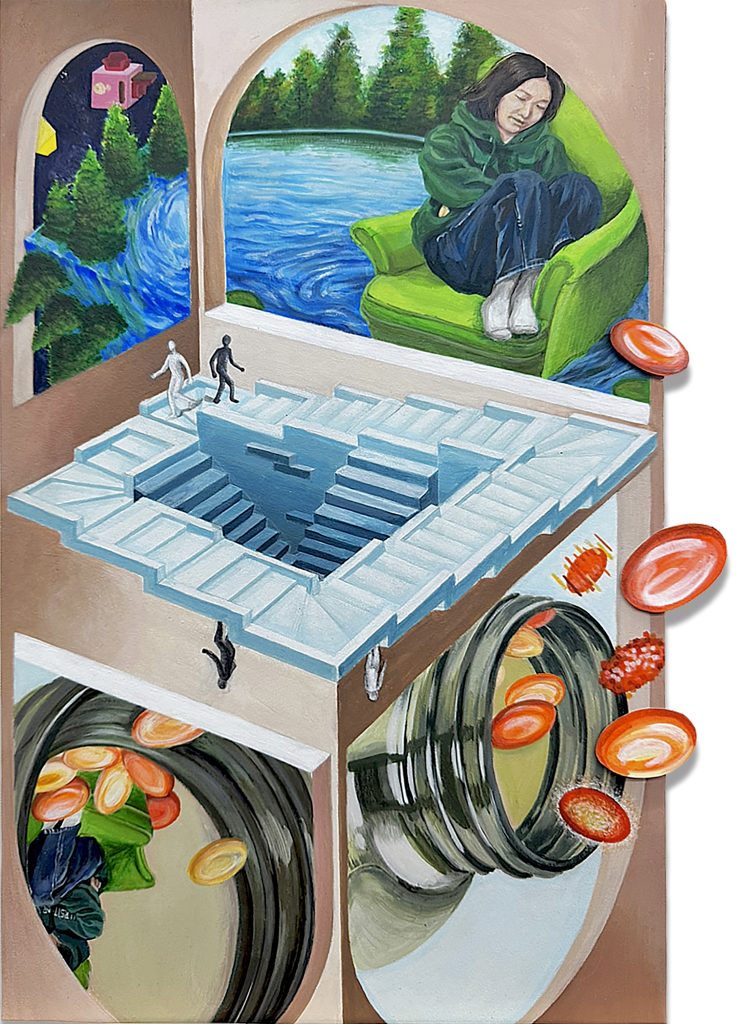





Erin Kim is a student attending a school in Seoul, South Korea. When she has not trapped herself in her room alone working on her art, she enjoys playing tennis.

Reflection
On top of an old rug
smeared with footprints of grey, brown, and red
was a little boy—
who wore a coat, navy blue
and a pair of polished, leather shoes.
His eyes were blue,
like the endless sky above him
Next to him was a teenage girl—
Who wore bangle hoops and black headphones
With a grey cat in her arms
She gazed into the vibrant city lights,
Lightly humming a rhythm with a sotto voice.
Her eyes reflected a burning shade of yellow,
and in them lay a fierce flicker of curiosity
and a vague excitement for a better tomorrow
Across two tables and a counter was a barista.
she held a portafilter in one hand
and an espresso machine base in another
Sunlight illuminated her black hair,
reflecting her soft, hazel eyes into a shade of orange.
In them, lingered a quiet protest.
And an unspoken fear for another restless dawn.
Lili Mariline
3 AM in the morning, Fifth Avenue, New York.
She walked down bricky tapestry of memories
All neatly knit together on one breezy autumn night.
The streets were vibrant in neon colors, and the streetlights were dim—
yet, with hordes of moths.
Craving for the flickering of light bulbs,
One by one fluttering to the ground, lifeless.
She re-opened a letter he sent her years ago
and smelt a fragrance of his nostalgic cynicism.
It came from a land far away,
Where bullets were words—-and truths are silenced.
It came from a world so different from the one she lives,
One she has never dared to imagine.
She heard a faint melody of his, singing ‘Lili Mariline’.
Then, she gazed into the distance.
Thinking about the very spark that once made life in her world
And one that had once filled her heart with joy.
With a stream of memory running down her left cheek,
With panoramas of forgone yesterdays running down her other,
And with a dim reminiscence of his last goodbye,
Her castle of conscience reached its last chapter, and then—
She fell.
Memories of Kindergarteners
This ground bears the memories of kindergarteners
Mashed flowers and a sandbox, the hot sun baking two plastic slides—-
And a child, fallen from a swing—running to her mother.
This is the last ground she’s touched since then,
as she felt the hands of a million, pushing her down.
Burying the girl’s arms into her beautiful nature,
This is where she sank—and sank—
Wrapping herself around the warm, bottomless sandpit.
This is where I saw leftovers of a Hawaiian pizza, rolling on the ground.
This is where I played hide-and seek with my parents, after school.
This is where my friend walked her dog, wearing that pink ribbon of hers.
This is where I stood barefoot, building sand-castles all day.
And this is where I last saw you, after all these years
This is where you carved that map of mahogany inside my heart,
As you plunged into the unreachable abyss,
on your own.
Alina Lee is a high school student at an international school in Seoul, South Korea. Her writing explores memory, identity, and the quiet moments between people. When she’s not writing, she enjoys hiking, running, and playing the ukulele. Her work is inspired by the natural world and the rhythms of everyday life.
Regret
Dark, screen lit, wet hair against the pillow
Typed regret in to the blank box
like it would tell me something new
I found were pages full of shadows
‘Sadness’ ‘repentance’ ‘disappointment’
Nothing soft, nothing I wanted to see
I place my fingers on the keyboard again
“Does regret ever go away?”
‘Linger for years’ ‘settles deep’
I wasn’t looking for that
Between the Stings
She eats a popsicle in the back seat
Cold enough to numb her teeth
The car seat burns the back of her thighs
The purple syrup runs down her wrist and onto her elbow
And bruises the carpet beneath her feet
At the pool, kids cannonball too close
The water splashes and stings her eyes
She floats on the water anyways,
listening to the shrieks muffled underneath the water
While the sun toasts her shoulders
The barbeque smells like charcoal and spilled soda
Bees hover over the juice pitchers
She watches one of them drown in the lemonade
She regrets not getting another cup
But the chips are salty and good
And the watermelon is cold enough to make up for it
The sun goes down, an orange slouch behind the fence line
The air starts to cool off and her hair is almost dry
She sits back in a sunbed laid out in the middle of the backyard
Someone left a towel bunched in the chair
It starts to smell
But she uses it as a pillow anyway
Mosquitoes start to come out as the sun disappears completely
Guests leave the house and the quiet of the night settles in
She heads to the old porch swing that no one ever uses
She brushes off the twigs and rearranges the cushions
Only to find an old lollipop melted and smothered into one of the pillows
In the dark, she walks back barefoot,
stepping on something sharp in the grass
It makes her flinch,
but she just rolls her eyes and keeps walking
She steps on to the cold kitchen tiles and shuts the door behind her
The Silence Between Us
You came back from the hallway trying to get wifi,
Failed, and layed on your bed
I kept writing, but couldn’t get anything done
In the corner of my bed, the goose sat still, its neck long and upright
We stayed up till’ late at night,
our knees on the floor and hands busy on our beds
Trying to finish our bio, history, and English homework at the same time
In the corner of my bed, the goose sat still, it’s fur soft, and an off-white color
The fight started over a misunderstanding,
Words were said too fast, then nothing for hours
But we both knew that we were going to be okay by tomorrow
In the corner of my bed, the goose sat still, it’s plastic eyes round and black
Facing each other, sitting on our beds with our legs crossed over
We asked a million stupid, hypothetical questions
“If I were a color, what would I be?” “You would be a werewolf if you were in Vampire Diaries”
In the corner of my bed, the goose sat still, it’s bright yellow feet stretched outwards
Irene Kim is a high school student who loves visual art and writing. Her work has been recognized in local exhibitions and school publications. When she’s not drawing or writing, she enjoys reading poetry, walking in the rain, and experimenting with collage. Irene hopes to continue creating work that captures both the quiet and the extraordinary.
Deep in My Drawer
We changed.
I outgrew my blunt bob.
You live in the future.
But like steam fading from a mirror.
Good! I miss you!
More desperately than the beast with his glassed rose,
I thought if I stayed still enough—
Friendship is not a photograph
You didn’t hug me when I cried alone in my dorm, homesick
But we laughed half-asleep on the bed under a looming sun
My fullest, realest moments
You didn’t flinch.
A vintage Chanel worth more than anything still sealed in its box.
Because what’s worn is also what’s survived.
I type about writing
I have good handwriting
But it depends on the situation
When I have to write fast
When I’m too lazy
When I don’t have any energy to spend
I scribble
When I feel like being pretty
When it has to be presentable
When I show it to others
When it has to be aesthetically pleasing
I write every stroke with great care and love
My handwriting can be bad or good
But it’s never terrific
It can be
Only if I spend a lot a lot of time and effort
Until my neck
Shoulder
Back
Fingers hurt and ache
Is it worth?
Sometimes I do it
But should I always do it?
Until the terrific handwriting becomes my norm and usual
But can it be?
I enjoy writing pretty
Not just because of others reaction
Though I don’t remember the last time I was being terrific
Alexis Lee is a high school student and emerging poet who finds inspiration in fleeting moments, music, and the quiet details of daily life. Her work explores themes of memory, transformation, and human connection. When she’s not writing, she enjoys reading contemporary poetry, listening to indie music, and exploring local bookstores.
He had only one day
He had only one day.
He was thirty eight, a meager age. Poor man, he was; life passed by and stopped
before he had his way.
He had to seize the day –
and thwart it from flying away.
And so he tried to find the day – catch its tail and grab it until it would start to suffocate.
As the clock stroke three, he went out
to feel the sound of a summer day.
He didn’t know what was coming, yet
he had to flee from the cavern of his stuffy room;
reign earth before he had to go back and return his breath to mother nature on his way.
Funny, it was. He noticed the little.
He saw the ants, forming long barcodes with
They were moving, eager, ground earthy
more than ever.
He paid attention to the azure skies, cradling
clouds that made many lives.
Zebras! Elephants! Giraffes! He stared, elated, though
the vast expanse of the sky had always been above his eyes.
Did he miss anything in his way?
He stood to see –
make sure that no images pass by, like the wind on that one lonely night. He failed to stop time, but
he captured every moment – opened up a bubble to protect himself
from the fast-moving day.
Fried Rice
It was all simple, when
mama used to cook me fried rice.
She just threw in bowls of white pebbles in the black pan – saw it jumping, dancing to the beat of life.
How do you cook so quickly, I asked. To that, she grinned and said,
Son, fried rice does not require the blessing of time.
She was never afraid to change the recipe,
succumbing to her little whims
as ingredients caught her sight.
Carrots, Potatoes, Bacon – everything she saw, she chopped and threw it into her cauldron, together with her little frights.
It’s better that way, she replied to my unasked question, as she turned around to clean the aftermath of her bloody kitchen, slightly smiling, as if she somehow
knew the secret of life.
It all got too difficult,
after I flew out of mama’s nest.
I tried to talk to the world, break the silence, but
it only responded with awkward murmurs and lies.
So, now I’ll make the world my fried rice.
We’ll not talk; we’ll stare at each other
like lovers on first date.
I’ll just hand it a plate of fried rice, put into the shape of a heart, but we’ll both know that our lives got more simple
than it ever were.
Walking on White Snow
I’m scared to walk on white snow.
I’m afraid that I’ll make footsteps with my dirty shoes. Touch what I should not touch –
take what has been taken from me for a long while.
I stand by my front door and wonder
how the snow maintained its beautiful, curvy figure
over the long, scary night,
how it never encountered the touch of a stranger who could do things that he knew were just not right.
I don’t want to leave any marks on this trail of white snow; I want to protect it
and ensure that it keeps its whiteness that I so greatly miss, on some quiet night.
So, I’m scared to walk on white snow.
As much as I love a winter day, I shall stay in my house, let the snow stay this way
& hope that it will stay this way for a long while
Sean Lee is a high school student at an international school in South Korea with a passion for poetry and creative writing. Growing up in a multicultural environment, he finds inspiration in the intersection of different cultures, languages, and personal experiences. His poetry often explores themes of belonging, memory, and emotional introspection.
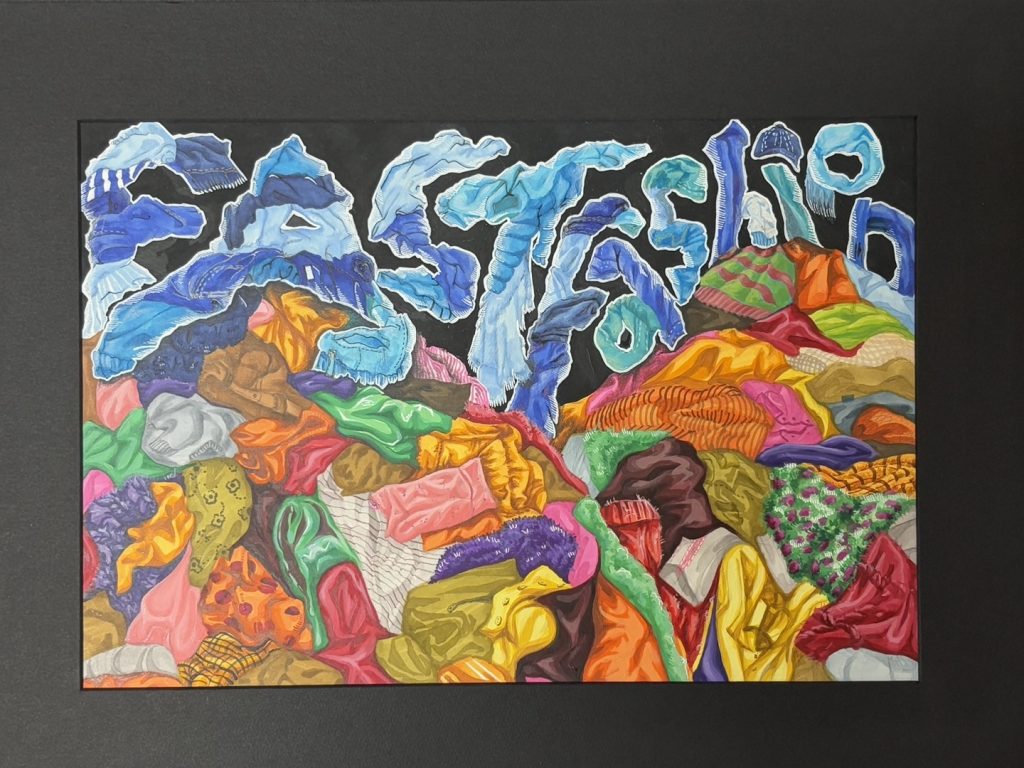
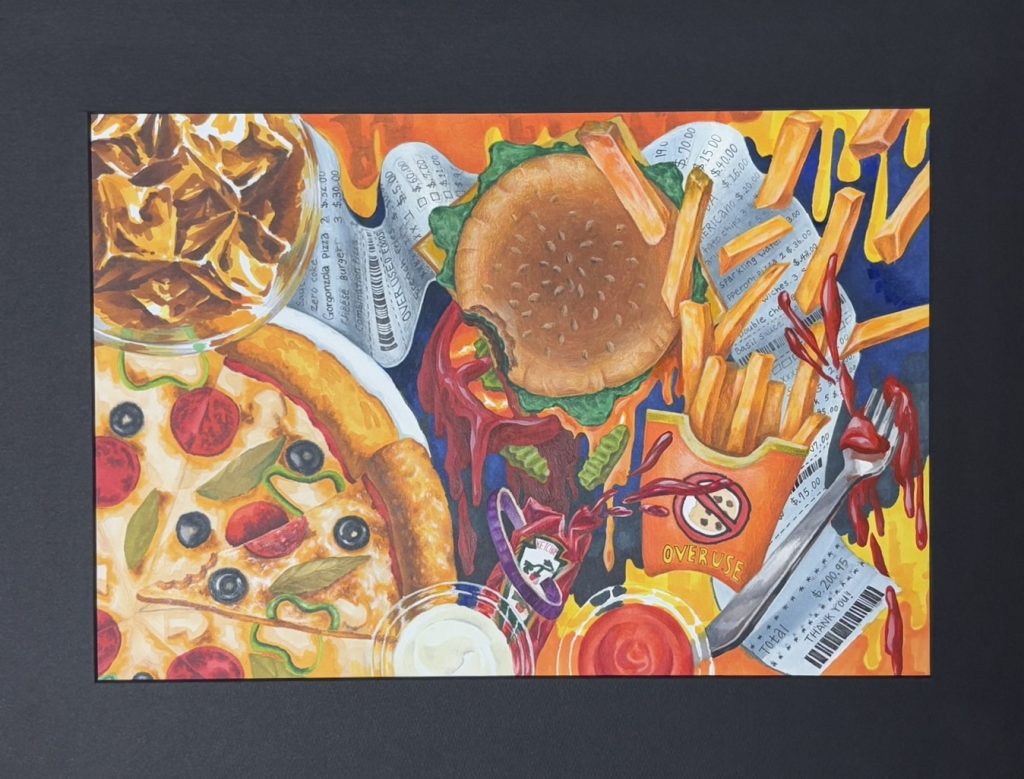
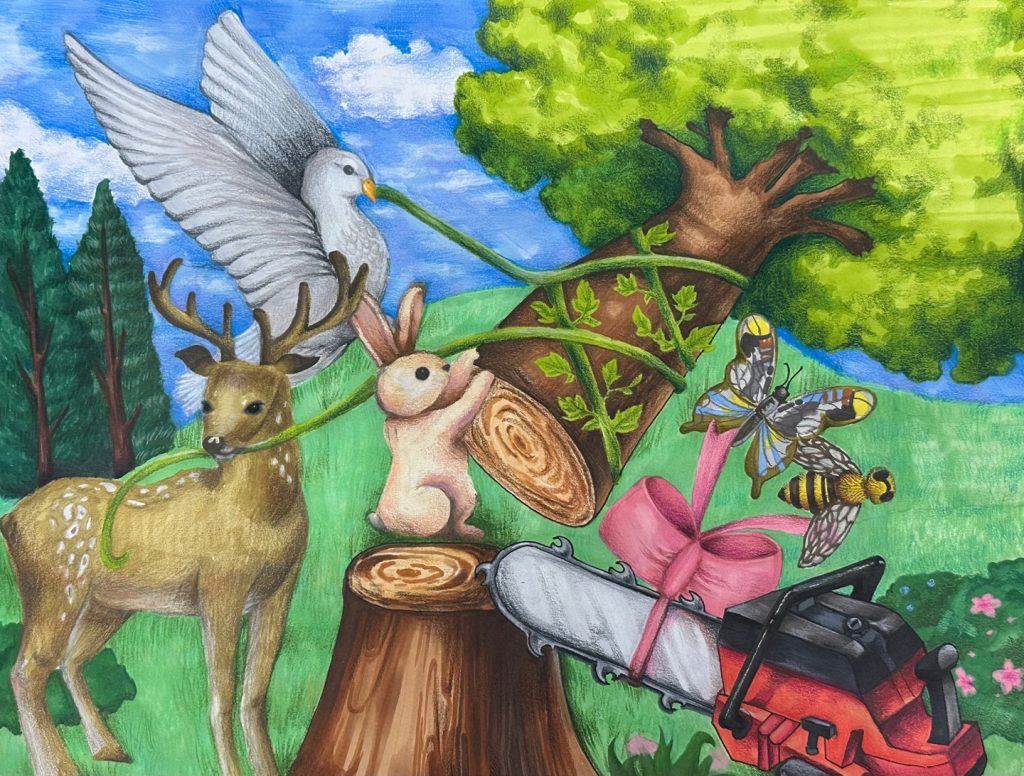
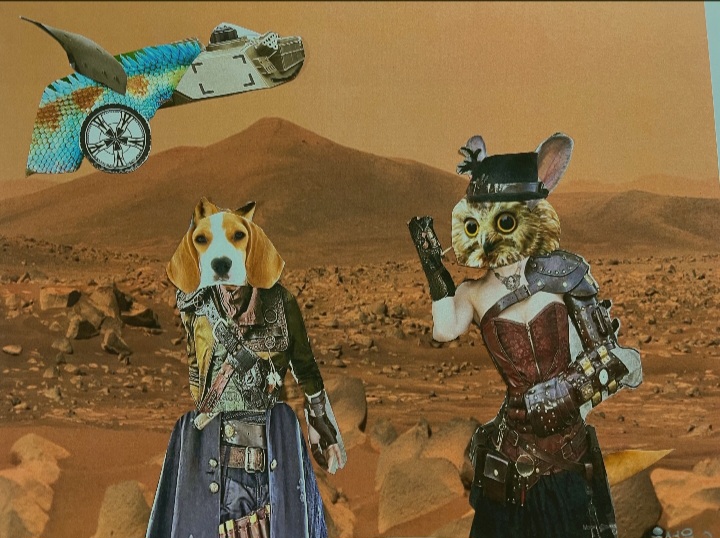
Sophie Yoon is a student and aspiring artist. Drawing inspiration from her surroundings and personal experiences, she uses various mediums to craft pieces that connect on an emotional and thought-provoking level. Sophie is passionate about storytelling through art and hopes to inspire others with her unique perspective.